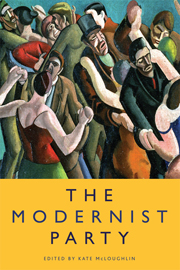Book contents
- Frontmatter
- Contents
- A Note of Thanks
- The Guest List
- Introduction: A Welcome from the Host
- 1 ‘The dinner was indeed quiet’: Domestic Parties in the Work of Joseph Conrad
- 2 Prufrock, Party-Goer: Tongue-Tied at Tea
- 3 Party Joyce: From the ‘Dead’ to When We ‘Wake’
- 4 ‘Looking at the party with you’: Pivotal Moments in Katherine Mansfield's Party Stories
- 5 Virginia Woolf's Idea of a Party
- 6 Proustian Peristalsis: Parties Before, During and After
- 7 ‘Ezra through the open door’: The Parties of Natalie Barney, Adrienne Monnier and Sylvia Beach as Lesbian Modernist Cultural Production
- 8 ‘Indeed everybody did come’: Parties, Publicity and Intimacy in Gertrude Stein's Plays
- 9 The Interracial Party of Modernist Primitivism and the Black ‘After-Party’
- 10 The Party In Extremis in D. H. Lawrence's Women in Love
- 11 Bohemian Retrospects: Ford Madox Ford, Post-War Memory and the Cabaret Theatre Club
- 12 ‘Pleasure too often repeated’: Aldous Huxley's Modernity
- Index
8 - ‘Indeed everybody did come’: Parties, Publicity and Intimacy in Gertrude Stein's Plays
Published online by Cambridge University Press: 05 April 2014
- Frontmatter
- Contents
- A Note of Thanks
- The Guest List
- Introduction: A Welcome from the Host
- 1 ‘The dinner was indeed quiet’: Domestic Parties in the Work of Joseph Conrad
- 2 Prufrock, Party-Goer: Tongue-Tied at Tea
- 3 Party Joyce: From the ‘Dead’ to When We ‘Wake’
- 4 ‘Looking at the party with you’: Pivotal Moments in Katherine Mansfield's Party Stories
- 5 Virginia Woolf's Idea of a Party
- 6 Proustian Peristalsis: Parties Before, During and After
- 7 ‘Ezra through the open door’: The Parties of Natalie Barney, Adrienne Monnier and Sylvia Beach as Lesbian Modernist Cultural Production
- 8 ‘Indeed everybody did come’: Parties, Publicity and Intimacy in Gertrude Stein's Plays
- 9 The Interracial Party of Modernist Primitivism and the Black ‘After-Party’
- 10 The Party In Extremis in D. H. Lawrence's Women in Love
- 11 Bohemian Retrospects: Ford Madox Ford, Post-War Memory and the Cabaret Theatre Club
- 12 ‘Pleasure too often repeated’: Aldous Huxley's Modernity
- Index
Summary
This chapter is concerned with Gertrude Stein's response to two modernist parties, one a dinner-party given by the English painter Harry Phelan Gibb and his wife Bridget in Paris in April 1913 to which Gertrude Stein and her companion Alice Toklas were invited by the host, and one a cocktail-party in Hollywood given by Lillian May Ehrman in Stein's honour in April 1935. These parties span the period of modernism, taking us from the expatriate, avant-garde fervour of 1910s Paris to the popular American culture of the 1930s and, crucially, they provide a means through which to approach the more overlooked area of Stein's oeuvre: her dramatic writing. Stein's drama begins in 1913 with the play she composed in response to the dinner-party at the Gibbs' and, for at least one critic, develops into ‘much more sharply focused and much more theatrical’ work in the 1920s and after, including her play written about the 1935 Hollywood gathering. The two parties also illustrate Stein's own trajectory as a modernist: in 1913, a patron and friend of artists such as Pablo Picasso, Juan Gris and Gibb himself, with relatively little of her own work in print; by 1935, a major American celebrity, with her arrival in New York for a lecture tour announced in lights on Times Square and her Four Saints in Three Acts broadcast nationally over Columbia Radio and the longest-running opera in Broadway history.
- Type
- Chapter
- Information
- The Modernist Party , pp. 147 - 163Publisher: Edinburgh University PressPrint publication year: 2013



